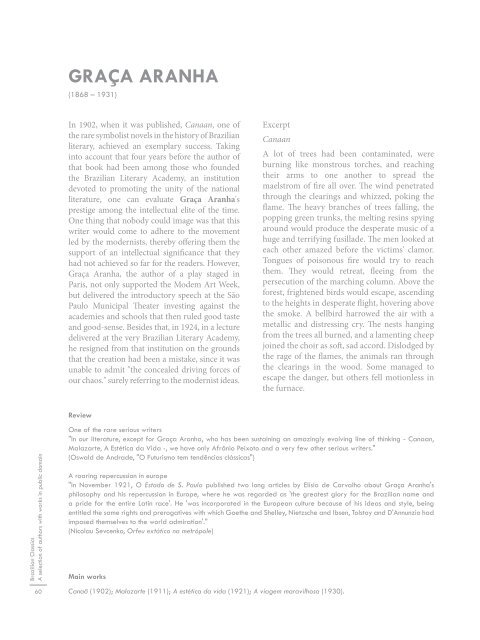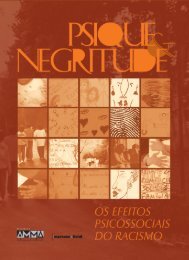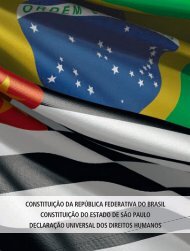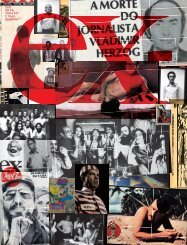CLÁSSICOS BRASILEIROS BRAZILIAN CLASSICS - Imprensa Oficial
CLÁSSICOS BRASILEIROS BRAZILIAN CLASSICS - Imprensa Oficial
CLÁSSICOS BRASILEIROS BRAZILIAN CLASSICS - Imprensa Oficial
You also want an ePaper? Increase the reach of your titles
YUMPU automatically turns print PDFs into web optimized ePapers that Google loves.
Brazilian Classics<br />
A selection of authors with works in public domain<br />
60<br />
GRAÇA ARANHA<br />
(1868 – 1931)<br />
In 1902, when it was published, Canaan, one of<br />
the rare symbolist novels in the history of Brazilian<br />
literary, achieved an exemplary success. Taking<br />
into account that four years before the author of<br />
that book had been among those who founded<br />
the Brazilian Literary Academy, an institution<br />
devoted to promoting the unity of the national<br />
literature, one can evaluate Graça Aranha's<br />
prestige among the intellectual elite of the time.<br />
One thing that nobody could image was that this<br />
writer would come to adhere to the movement<br />
led by the modernists, thereby offering them the<br />
support of an intellectual significance that they<br />
had not achieved so far for the readers. However,<br />
Graça Aranha, the author of a play staged in<br />
Paris, not only supported the Modem Art Week,<br />
but delivered the introductory speech at the São<br />
Paulo Municipal Theater investing against the<br />
academies and schools that then ruled good taste<br />
and good-sense. Besides that, in 1924, in a lecture<br />
delivered at the very Brazilian Literary Academy,<br />
he resigned from that institution on the grounds<br />
that the creation had been a mistake, since it was<br />
unable to admit "the concealed driving forces of<br />
our chaos." surely referring to the modernist ideas.<br />
Review<br />
Main works<br />
Canaã (1902); Malazarte (1911); A estética da vida (1921); A viagem maravilhosa (1930).<br />
Excerpt<br />
Canaan<br />
A lot of trees had been contaminated, were<br />
burning like monstrous torches, and reaching<br />
their arms to one another to spread the<br />
maelstrom of fire all over. The wind penetrated<br />
through the clearings and whizzed, poking the<br />
flame. The heavy branches of trees falling, the<br />
popping green trunks, the melting resins spying<br />
around would produce the desperate music of a<br />
huge and terrifying fusillade. The men looked at<br />
each other amazed before the victims' clamor.<br />
Tongues of poisonous fire would try to reach<br />
them. They would retreat, fleeing from the<br />
persecution of the marching column. Above the<br />
forest, frightened birds would escape, ascending<br />
to the heights in desperate flight, hovering above<br />
the smoke. A bellbird harrowed the air with a<br />
metallic and distressing cry. The nests hanging<br />
from the trees all burned, and a lamenting cheep<br />
joined the choir as soft, sad accord. Dislodged by<br />
the rage of the flames, the animals ran through<br />
the clearings in the wood. Some managed to<br />
escape the danger, but others fell motionless in<br />
the furnace.<br />
One of the rare serious writers<br />
"In our literature, except for Graça Aranha, who has been sustaining an amazingly evolving line of thinking - Canaan,<br />
Malazarte, A Estética da Vida -, we have only Afrânio Peixoto and a very few other serious writers."<br />
(Oswald de Andrade, "O Futurismo tem tendências clássicas")<br />
A roaring repercussion in europe<br />
"In November 1921, O Estado de S. Paulo published two long articles by Elísio de Carvalho about Graça Aranha's<br />
philosophy and his repercussion in Europe, where he was regarded as 'the greatest glory for the Brazilian name and<br />
a pride for the entire Latin race'. He 'was incorporated in the European culture because of his ideas and style, being<br />
entitled the same rights and prerogatives with which Goethe and Shelley, Nietzsche and Ibsen, Tolstoy and D'Annunzio had<br />
imposed themselves to the world admiration'."<br />
(Nicolau Sevcenko, Orfeu extático na metrópole)









